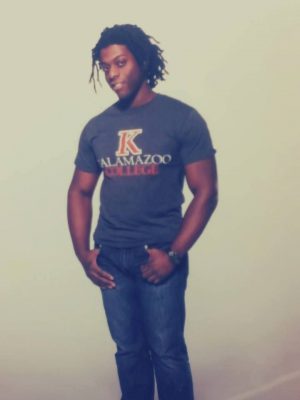Kalamazoo College alumni Justin Danzy ’16 and Marquise Griffin ’15 have created a virtual communal space shared by a team of thinkers and artists free to create and share content that promotes their vision of a more informed, empowered and collaborative diasporic community. The Black Diaspora Project is a collaboration between two groups of friends from opposite sides of the globe in an attempt to forge connections between millennials and members of the African diaspora. It’s also a space where people express unique worldviews and forward the vision of a more just, equitable world.

A month after graduating from Kalamazoo College, Danzy spent a month and a half in Uganda working with the Bavubuka Foundation, which inspires youths to embrace and celebrate their native languages, culture and tradition. It conducts a yearly hip-hop summit, which includes youth performances and workshops taught by contributing professionals in media, recording arts and writing. The relationships he built in Uganda were what led to the Black Diaspora Project, an online space created Feb. 20, 2017. Danzy expresses with great passion how his experience at Kalamazoo College prepared him for what the world would bring post-graduation.
He admits: “K really took me out of my comfort zone and forced me to learn a lot about how maneuver and preserve yourself … I met many wonderful friends and mentors who went out of their way to help steer me while I was on this journey of understanding. For instance, Di Seuss introduced me and seduced me into the world of creative writing, which has become a haven for me. She also introduced me to the executive director of the organization that I currently work at. Dr. Bruce Mills affirmed my ability as an academic in a way that really bolstered my self-confidence … His tutelage led to me presenting my SIP at the International James Baldwin Conference at American University in Paris, France last spring. Lastly, Dr. Lisa Brock and Mia Henry provided a space for me to grow on my own terms, while also giving the language that greatly assisted in me understanding some of the things I was experiencing for the first time at K. Working with them at the Arcus Center also led to me meeting Silas Balabyekkubo, the founder of the Bavubuka Foundation, who I ended up partnering with in Uganda for our hip-hop and sustainable agriculture initiative, which planted the seed for what was to become the Black Diaspora Project.”
Danzy was joined by fellow alumnus and friend Griffin, who after graduating from K began pursuing his master’s degree in educational leadership and policy analysis at the University of Missouri-Columbia. There, he studies the structure of higher education, its administration, processes, culture and the policies that affect it. Griffin is the co-editor-in-chief, working closely with Danzy on making creative decisions regarding the Black Diaspora Project, its structure, direction and what they want from contributors.

While they were students at K, Griffin and Danzy discussed their desire to spearhead a collaborative project inspired by their love of writing and the ritual of workshopping poetry. After Danzy’s experience in Uganda, Danzy went to Griffin with the idea for the Black Diaspora Project. Griffin happily helped bring the idea to fruition. Griffin admits Danzy’s “tireless enthusiasm and the amount of work he put into the site pulled me in and I began to see the potential for this to be a true collaboration of creative people, all working to expand their knowledge of themselves and others.”
Danzy said the ultimate goal of the Black Diaspora Project is to provide an honest depiction of the African diaspora and enhance the audience’s understanding of blackness on a global scale. He wants to prioritize the understanding of a global blackness, to offer diverse and positive depictions of contemporary Africa. Furthermore, to offer a resource that does not look upon Africa with pity and endow it with charity. The Black Diaspora Project can contribute to moving toward this understanding of an autonomous Africa that is full of talent and the acumen to create a better future for the continent.
Text by Aunye Scott-Anderson ’18

